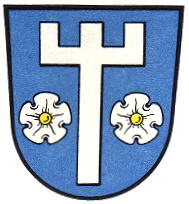Homburg am Main: Difference between revisions
Knorrepoes (talk | contribs) m (Text replacement - "|center|Wappen von {{PAGENAME}}]] " to "|center|alt=Wappen von {{PAGENAME}} / Arms of {{PAGENAME}}]] ") |
Knorrepoes (talk | contribs) m (Text replacement - " / Arms" to "/Arms") |
||
| Line 7: | Line 7: | ||
Incorporated into : 1978 [[Triefenstein]] | Incorporated into : 1978 [[Triefenstein]] | ||
[[File:homburgm.jpg|center|alt=Wappen von {{PAGENAME}} / Arms of {{PAGENAME}}]] | [[File:homburgm.jpg|center|alt=Wappen von {{PAGENAME}}/Arms of {{PAGENAME}}]] | ||
{| class="wikitable" | {| class="wikitable" | ||
Revision as of 11:14, 2 September 2022
This page is part of the German heraldry portal Deutsche Wappensammlung |
Heraldry of the World |
|
German heraldry:
|
Selected collector's items from Germany:
|
HOMBURG AM MAIN
State : Bayern
District (Kreis) : Main-Spessart (until 1973 Marktheidenfeld)
Incorporated into : 1978 Triefenstein
| German | |
| English | am Main No blazon/translation known. Please click here to send your (heraldic !) blazon or translation |
Origin/meaning
Homburg developed around the castle of the same name and received city rights in 1332. The city was a fortress of the Bishops of Würzburg. The oldest seal dates from 1644 and shows already a fork and roses. The fork was used to catch otters in the Main river. The roses are derived from the arms of the Counts of Wertheim who ruled the city as vassals for the bishops.
Later the fork was mis-interpreted as a castle, resulting in the present shape.
Contact and Support
Partners:
Your logo here ?
Contact us
© since 1995, Heraldry of the World, Ralf Hartemink 
Index of the site
Literature : Stadler, 1964-1971, 8 volumes; Hupp, O: Kaffee Hag albums, 1920s












